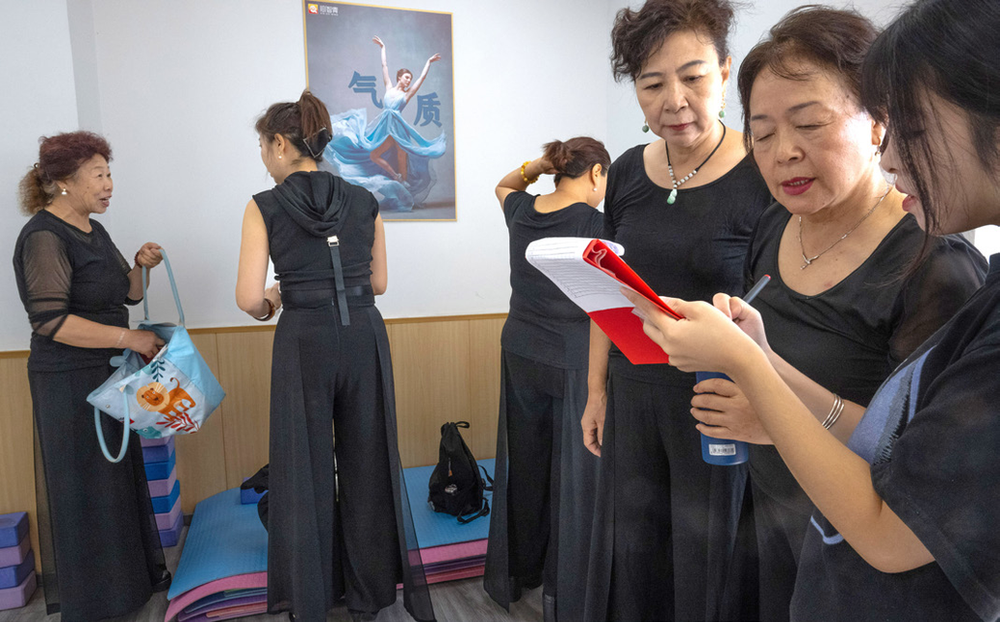
By Claire Fu and Daisuke Wakabayashi
For over ten years, Li Dongmei ran multiple kindergartens and educational institutions for young kids, enduring the challenges posed by China’s decreasing birthrate. In 2020, she had to confront reality.
The diminishing child population resulted in increasingly lower enrollments of infants and toddlers at her schools. The disruptions caused by the COVID-19 pandemic served as a tipping point, leading her to redirect her attention toward a different and more plentiful demographic: senior citizens.
At her learning center in Jinan, a city in eastern China, she provides singing, dancing, music, and art courses for older adults. She arranges activities and educational excursions for her students. Unlike children who have school breaks, Li mentioned that older adults attend classes throughout the year, and they are fully booked.
“The largest economy is the silver economy,” Li, 36, stated. “It surpasses the children’s market.”
China’s aging population is predicted to erode the energy and dynamism of the world’s second-largest economy in the decades to come. Nevertheless, the negative impacts of demographic shifts are already visible for Chinese companies that focus on children. Many are downsizing or altering their business strategies.
Dairy companies that once produced formula for infants are now creating powdered milk for seniors. Owners of preschool and kindergarten facilities are shutting down to establish senior care centers. A tech company that manufactured gadgets for parents to monitor their young kids is now developing products to help adult children keep in touch with their aging parents.
In 2022, for the first time since 1961, China’s population declined. Deaths outnumbered births again last year, with over 290 million individuals aged 60 and above, equating to one in five people in China. The National Health Commission of China estimates that the number of elderly residents will exceed 400 million by around 2035.
To tackle its aging demographic, China announced on Friday that it had approved a plan to raise the country’s mandatory retirement age for the first time since the 1950s.
For years, China has sought to mitigate its demographic crisis. It fully lifted its one-child policy in 2016 and introduced various incentives to motivate families to have more children. However, recent economic difficulties have led young people to question their ability to support larger families.
One major concern is that a decline in births will lead to a reduced labor force, which may undermine tax revenues and increase pressure on healthcare and pension systems.
In a directive from 2021, China’s State Council called for “actively promoting the silver economy” and developing “elderly-friendly sectors.”
Li, the education leader who closed her children’s schools, now provides a range of classes for seniors, including one that teaches them to walk like fashion models on a runway. She also trains her students in becoming online influencers by offering lessons on making short videos.
Xinjiang Tianrun Dairy, a state-owned entity, also targeting older consumers, acquired a smaller competitor last year to focus on producing powdered milk for middle-aged and senior individuals.
Nestlé, the Swiss food and beverage company, cited the sharp drop in births in China last year when announcing plans to shut down its infant formula factory in Ireland. It, along with Chinese dairy companies, has launched specialized powdered milk products that offer health benefits for seniors, such as preventing muscle loss, enhancing sleep quality, and aiding digestion.
A prominent Chinese dairy firm, Yili Group, promotes its products for seniors through TV advertisements. In one commercial, a young couple purchasing specialized powdered milk — free from cane sugar — as a gift for their relatives during the Chinese New Year.
It’s not limited to milk. Since 2013, the Chinese cybersecurity company 360 Security Technology has been producing smartwatches for kids that allow parents to reach their children and monitor their location and internet activities.
In 2019, recognizing “the emergence of an aging society,” the company introduced smartwatches for seniors equipped with features like blood pressure and heart rate monitoring, location tracking for concerned relatives, and emergency calling with a single click.
The expanding senior market compels Chinese businesses that previously targeted children and their guardians, according to He-Ling Shi, an associate economics professor at Monash University in Melbourne, Australia.
“They have no alternatives,” he remarked.
Birth rates in China dropped to 9 million in 2023, a decrease of approximately 6% from the previous year. Additionally, the number of preschool-aged children fell by nearly 12%, as reported by China’s Ministry of Education.
Cai Hao established a maternity and baby goods shop in 2018 in Shijiazhuang, in northern Hebei province. His store initially focused on clothing and footwear for infants and toddlers.
A temporary uptick in newborns after China implemented a two-child policy quickly waned, and the pandemic negatively impacted foot traffic to the store.
“There were no customers,” Cai recounted. “Without children, customers had no reasons to visit.”
However, a few years ago, shoppers began inquiring if his store stocked powdered milk for older individuals. Realizing he had little to lose, Cai decided to add it to his inventory. Sales increased, prompting him to introduce various options, including one tailored for diabetics and another for those with high blood pressure.
Cai mentioned that he never consciously chose to shift toward older clientele, yet now approximately 10% of his sales originate from dairy products aimed at seniors.
He concluded, “Who wouldn’t want to sell more if they had the chance?”
